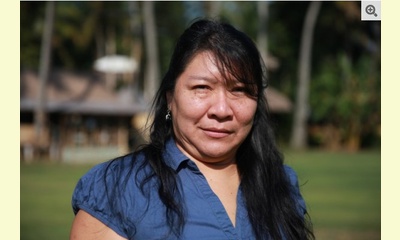|
|
Brazil's first indigenous woman lawyer beats prejudice to battle for land rights
un articulo por Thin Lei Win, Thomson Reuters Foundation
Raised in isolated villages in the Brazilian Amazon, Joenia Batista de
Carvalho grew up loving nature and taking pride in her tribe’s
customs, way of life and Indian identity. Carvalho is a Wapixana
Indian, one of five tribes totalling around 20,000 people who have
lived for generations in the Raposa-Serra do Sol - meaning “Land of
the Fox and Mountain of the Sun” - in Brazil’s northernmost
Roraima state. 
Joenia Batista de Carvalho, the first female indigenous lawyer in Brazil, pictured at the "Summit on Women and Climate" in Bali, Indonesia, Aug. 6, 2014. TRF/Thin Lei Win
click on photo to enlarge
When Carvalho was seven, the family moved to town while her
father stayed behind. That was when she became keenly aware of
the prejudice Indians face in Brazil. “People don’t want to stand
close to you. They are suspicious - they think you are a disgusting
person and you will steal their things,” she recalled. There were
sniggers about her looks and ambition.
The family’s move was for the sake of the children’s education, but
only Carvalho, the youngest of six, managed to shake off the
persistent discrimination and stay in school. The experience
strengthened her resolve to help her people.
“That is the reason I studied law: to become someone who can
support indigenous communities,” she told Thomson Reuters
Foundation at the first “Summit on Women and Climate” in Bali,
Indonesia, earlier this month. “For me it’s about being able to do
something for ourselves - not waiting for orders from the state or
people who want to take away our land,” she added.
True to her words, Carvalho became Brazil’s first female indigenous
lawyer, despite scepticism from classmates and even her own
community. “When I started, the first challenge was with my own
people. Women studying was not a common practice, and the
indigenous leaders asked me whether I could do a man’s job,” she
said. “I needed to work harder than others and prove I was capable.”
Since then, Carvalho has dedicated herself to fighting for
indigenous land rights and against deforestation.
Her battle could receive a boost if Marina Silva, a popular anti-
establishment icon and former environment minister just selected
by the Brazilian Socialist Party as its presidential candidate, wins
October’s elections.
A decade ago, Carvalho took on powerful interests encroaching on
her ancestral land. According to Survival International, over 20
Indians were killed and hundreds injured in some three decades of
struggle pitting the tribes against ranchers, miners, loggers and
farmers backed by local and national politicians.
In early 2004, Carvalho submitted a complaint to the Inter-
American Commission on Human Rights, urging the Brazilian
government to complete demarcation of the Raposa-Serra do Sol
reserve so that the area would be protected. She also brought the
case to the Brazilian Supreme Court.
(This article is continued in the discussionboard)
|








|
DISCUSSION
No hay pregunta ligada a este article.
* * * * *
Comentario más reciente:
(The following is continued from the main article listed above.)
In April 2005, the area was officially recognised by the government of Luis Inácio Lula da Silva.
But indigenous jubilation was short-lived.
The Roraima state government soon lodged a petition with the Supreme Court contesting the recognition and demanding the reserve be reduced in size. The military also wanted it broken up, arguing that Indian reservations along national borders represented a security threat, according to Survival International.
Carvalho once again represented the Indians, using the law, often regarded as a white man’s weapon, to ensure that indigenous communities would have rights to the land they have been living on as long as they can remember.
In a landmark ruling in March 2009, the majority of Supreme Court judges upheld the Indians’ rights to their land.
Carvalho became synonymous with the case. For her, it was a conscious decision to take on a high-profile role.
“Before, indigenous people were totally invisible. . ... continuación.

|
|









